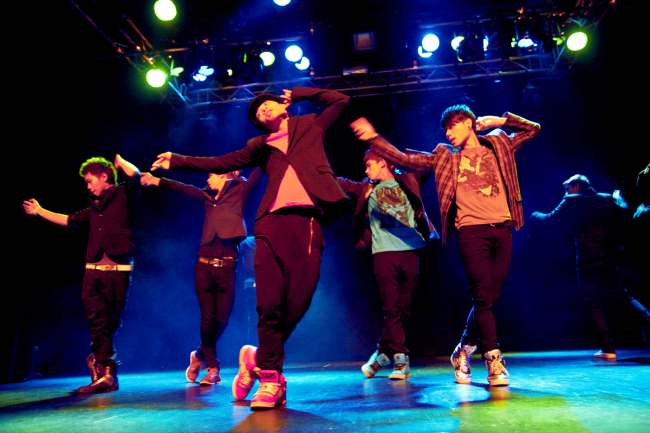Korean culture fever grips Finland
Growing interest in K-pop boosts Korea-Finland cultural ties
By Korea HeraldPublished : Aug. 27, 2013 - 19:47

HELSINKI ― You wouldn’t believe it unless you saw it: More than 100 young Finns, mostly teenage girls, were dancing to the latest K-pop tunes at the Gloria Culture Center in the Finnish capital city of Helsinki on the evening of Aug. 10.
The dance hall with a large stage was filled with people dressed in Seoul street fashion dancing to the songs of SHINee, GD&TOP and 2NE1 at the “Annyeong (Hello) Party.” The blondes and brunettes with fair skin sang along and even mimicked the sophisticated raps that would easily make most Koreans fall short of breath.
When “Lucifer,” one of the hit songs from boy band SHINee played, girls screamed then began performing the original choreography. When GD&TOP’s “High High” filled the air, nearly all attendees covered not only the pronunciation of the lyrics but also gave the right accent and groove. They giggled and cheered at the video images of their favorite stars such as BEAST and EXO, among others. The DJ would quickly switch the music if not all the crowd seemed to be impressed with the selection.
The dance hall with a large stage was filled with people dressed in Seoul street fashion dancing to the songs of SHINee, GD&TOP and 2NE1 at the “Annyeong (Hello) Party.” The blondes and brunettes with fair skin sang along and even mimicked the sophisticated raps that would easily make most Koreans fall short of breath.
When “Lucifer,” one of the hit songs from boy band SHINee played, girls screamed then began performing the original choreography. When GD&TOP’s “High High” filled the air, nearly all attendees covered not only the pronunciation of the lyrics but also gave the right accent and groove. They giggled and cheered at the video images of their favorite stars such as BEAST and EXO, among others. The DJ would quickly switch the music if not all the crowd seemed to be impressed with the selection.

“I can definitely sense some changes,” said Henna Puumala, a 22-year-old University of Helsinki student. Puumala, who has been in love with K-pop for more than six years, said she was impressed with the changing perception of K-pop.
“When I became interested in Korean pop music, only a handful of people knew about Korea. Two years ago, I came to this Annyeong Party and believe me, there weren’t this many,” she said. “But now, it seems that K-pop has become part of the culture here, too,” she added.
At the party’s Facebook page, 243 people expressed their willingness to attend the event. Party organizers said they decided to increase the number of Annyeong Parties this year due to the escalating attention to Korean pop music.
“We are having more people than ever and they are having genuine fun,” said a staff member of Jrock Suomi, the organizer of the party. The group was initially a Japanese rock performance organizer but extended into Korean pop music and is currently seeing remarkable success.
“K-pop has reached all continents despite not coming from a very large country, being a product of a globally small industry (compared to the U.S. music market for example), and being non-English in terms of language. It remains an underground movement among foreign fans ― major channels do not broadcast much about K-pop and fans themselves must actively find out about news and events,” said Kata Naaranoja, another university student who has been a K-pop fan for four years.
“Yet, in my opinion, K-pop has done what music most generally should: unite groups of people despite language and cultural barriers. That it has fans among all nationalities, religions and cultures is quite amazing. Korean is not spoken by a vast number of people, yet fans enjoy K-pop despite not understanding the songs or what their favorite artists talk about on TV shows,” she said.
Both Naaranoja and Puumala major in East Asian studies, with Korea being their main focus.
“Choosing my major initially had to do with my love for Korean culture,” Naaranoja said. “When I first learned Korean so that I could understand the lyrics and content, people did not approve of this. Nowadays, my mother takes me everywhere in my small hometown of about 5,000 people and says, ‘Look at my daughter, she goes to the University of Helsinki, majoring in East Asian Studies and speaks good Korean,’” Puumala laughed. She expressed her willingness to work in a field somehow related to Korea in the future.
The Finnish music industry is also keen on befriending its Korean counterpart. Since S.M. Entertainment, Korea’s most profitable showbiz agency, adapted Finnish pop group Nylon Beast’s “Like a Fool” into “Dreams Come True” for its girl group S.E.S. in 1998, Korea has become one of the most lucrative clients for its audiovisual content providers.
Music industry insiders from northern Europe including Finland, Sweden and Norway have formed EARS, Europe-Asia Roundtable Sessions, to focus on creative industry collaboration between Europe and Asia.
“I could sense that more people are interested in Korean music, and the market itself. With state-of-the-art information technology as well as high-level public education, the Finns are well informed of the latest trend in Korean music, both as fans and market analysts. They have been enthusiastic toward learning about what is attractive about Korean music and how they could penetrate our market with their composers and other content creators,” said Park Young-il, a Korean Creative Content Agency official.
“At the moment, the exchange of ideas and content between Korea and northern Europe is still in an early stage. But in the future, the European branch of KOCCA is planning to get deeper into Finland and trying to support the hallyu boom there,” he added.
By Bae Ji-sook, Korea Herald correspondent
(baejisook@heraldcorp.com)
-
Articles by Korea Herald




![[Herald Interview] 'Amid aging population, Korea to invite more young professionals from overseas'](http://res.heraldm.com/phpwas/restmb_idxmake.php?idx=644&simg=/content/image/2024/04/24/20240424050844_0.jpg&u=20240424200058)












![[KH Explains] Korean shipbuilding stocks rally: Real growth or bubble?](http://res.heraldm.com/phpwas/restmb_idxmake.php?idx=652&simg=/content/image/2024/04/25/20240425050656_0.jpg&u=)

